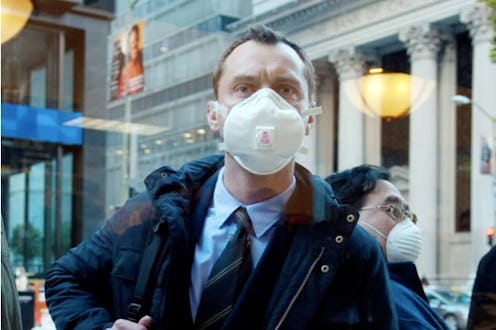Entertainment
Why You Probably Shouldn't Watch Pandemic Fiction, According To Psychologists

The novel coronavirus has officially been declared a pandemic, leading many worldwide to practice social distancing, self-isolating, and quarantining. It's a massive change to the order of daily life, one that is naturally causing heightened feelings of anxiety about coronavirus. One coping mechanism, though, is proving controversial: watching or reading pandemic-themed fiction.
As Bustle previously reported, the 2011 film Contagion has spiked on the iTunes movie rental chart in the wake of the coronavirus outbreak. And it's not just the Gwyneth Paltrow thriller. The 1995 medical disaster film Outbreak, which focuses on an outbreak of a fictional Ebola-like virus in small towns across America, has also seen a notable rise in popularity.
But are these types of movies and shows are actually a helpful salve in these trying times?
Overall, experts agree that pandemic fiction can offer a bit of levity. "There have been lots of references to The Walking Dead and the zombie apocalypse this week in my sessions," therapist Heidi McBain, LMFT, tells Bustle. "I've seen people use humor in reference to these shows as a way to diffuse some of the current anxiety they are feeling," she says. These works also offer a sense of control, according to Dr. Helen Odessky Phys.D., a clinical psychologist and author of Stop Anxiety From Stopping You. "We may feel like we are doing something to address the situation by learning more," she says.
While seeking out Contagion-type movies is a natural impulse, experts stress that viewers proceed with caution. "Watching movies about pandemics will, at best, have little to no impact on our fears," says Dr. Joshua Klapow Ph.D., a clinical psychologist. "But given the acuteness of the situation, the uncertainty, and the unprecedented actions being taken globally to combat coronavirus, movies that are designed to enhance emotional impact are much more likely to cause significant increases in anxiety."
Another issue to keep in mind is that these fictional pandemics can change the way people understand health information about COVID-19. "These narratives may create false or biased interpretations of the information being provided by health officials," says Dr. Klapow. Dr. Odessky agrees. "It's important to remember that the goal of fiction writers is to entertain by sensationalizing the effects of a particular issue," she says. Coronavirus isn't a dramatic plot point or a narrative device; it's real, and there are already enough myths and misunderstandings about it. We don't need pandemic fiction to complicate things further.
"These may be great works, but I would put them on the back burner for the next several weeks," says Dr. Klapow. Or at the very least, monitor your reactions as you consume this kind of content. "If you find yourself feeling on edge, see a negative change in your mood, or have others close to you notice a negative impact, it may be time to change course," Dr. Odessky says.
Experts:
Heidi McBain LMFT, therapist
Dr. Joshua Klapow Ph.D., clinical psychologist
Dr. Helen Odessky Phys.D., clinical psychologist
If you think you’re showing symptoms of coronavirus, which include fever, shortness of breath, and cough, call your doctor before going to get tested. If you’re anxious about the virus’s spread in your community, visit the CDC or NHS 111 in the UK for up-to-date information and resources, or seek out mental health support. You can find all Bustle’s coverage of coronavirus here, and UK-specific updates on coronavirus here.
This article was originally published on